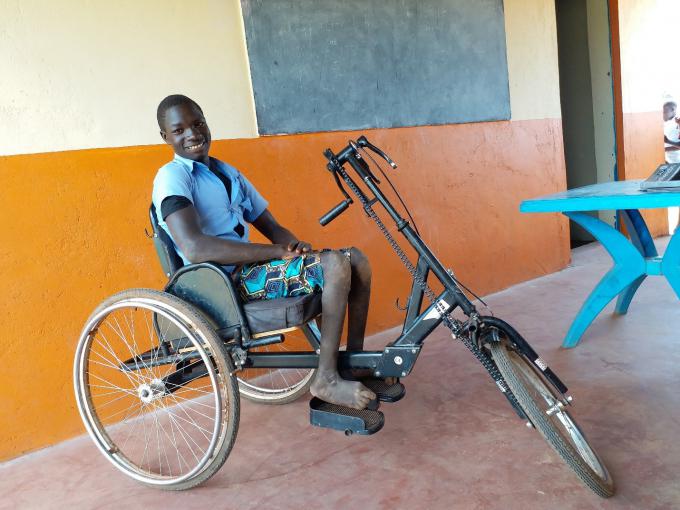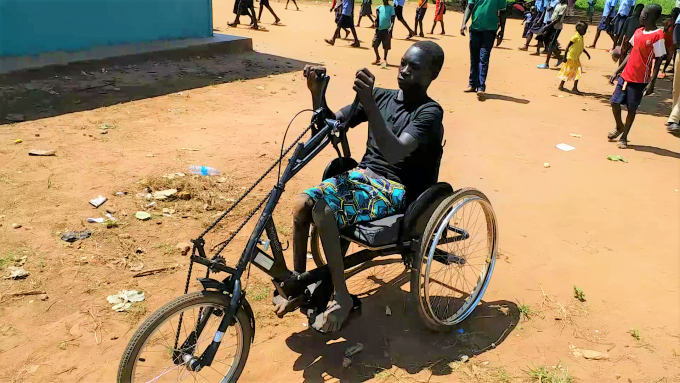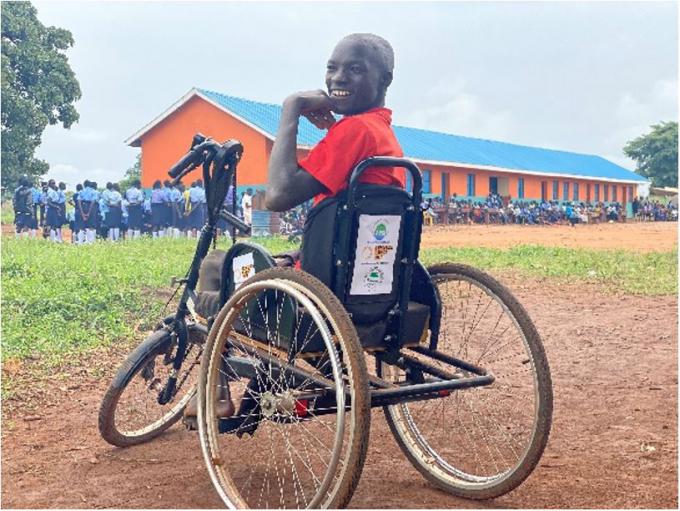Dream to learn reignited: Moses goes to school, one hand-pedal at a time.

“Disabilityis not inability,” says Moses – a 13-year-old student attending Obbo Nursery and Primary School in Magwi County – leaning back on his hand-cycle, and with a big smile on his face.
Suffering from leg paralysis caused by untreated childhood polio, Moses, for most of his life, has only been able to move by dragging his entire body with his hands, often facing excruciating pain. Basic things easily done by most children have been anything but basic or easy.
This includes access to education. Despite the closest school being a mere kilometer away from his home within the hills of Obbo village, muddy and rocky road conditions for most of the year has meant any attempt to crawl his way to school has been a painful process. He recalls feeling demoralized sitting in front of his home as he watched his able-bodied peers walk to school every morning. “I just gave up [hope], or even trying to leave the house [at all],” he says.
It was when he had entirely given up on his dreams of ever enrolling in school that a well-wisher supported him with a wheelchair. Finally, and with a newfound enthusiasm, Moses started going to school. Traversing the difficult terrain, he attended classes for a few years until one day in 2019 his wheelchair broke down.
Unable to repair or replace his old wheelchair, it was a crushing blow for Moses’ dreams of being educated and living a dignified life. Having finally begun learning after years of struggle, this sudden loss felt as if a crude joke was being played at his expense.
Despite the setback, Moses did not give up on his dream easily. His mother Achan* recounts, “[Moses] talked about being in school every day, and was not ready to give up. He tried crawling for a few weeks to go to school.”
However, the obstacle was too difficult to overcome. In a somber tone, Achan continues, “But due to the painful long journey, he could not persevere. So he gave up going to school [altogether].”
Recalling that same period, Moses says, “The wheelchair I had, was broken. I stopped school because I could not replace the device. So, I stayed home most of the time, and had lost all faith.”
Watching her son struggle every morning to attend classes and finally give up, Achan lived with a deep sense of guilt for most of the year. This was compounded by her inability to financially support Moses to purchase another wheelchair to continue his education.

It was at this point that staff from the AVSI Foundation – a Save the Children partner under the Multi-year Resilience Program (MYRP) consortium supported by Education Cannot Wait (ECW) – came across Moses when conducting a disability needs assessment in Magwi County of Eastern Equatoria State.
Under the MYRP program, Save the Children and its partners (such as AVSI) help address critical exclusionary factors, such as disability and gender, that prevent children from accessing education to realize their fullest potential.
To that end, immediately upon identification, the AVSI team brought Moses and his mother to receive further examination from three physiotherapy specialists recently brought to Magwi from the Juba Physical Rehabilitation Reference Centre (PRRC).
Otim Robert, the Gender and Inclusion Officer for AVSI who facilitated the referral, fondly recalls the treatment session, “Seeing opportunity to restore his lost hope, he was responding to the specialists with great enthusiasm.”
The specialists further referred Moses to the PRRC primary facility in Juba – a 90-kilometers road journey from his hometown – to conduct further assessment and undergo physical measurements to receive a new mobility device that is suitable for his needs and one that enables him to move freely, including to and from school. Only a few weeks later, Moses was back in his hometown with a brand new hand-cycle.
The hand-cycle has provided Moses with a renewed sense of energy and dedication to continue his studies. Immediately registered and enrolled in Primary Level three after coming back from Juba, Moses says, “I now come to school on a regular basis. This is unlike before where I had to miss classes [as a result of my condition]. There is changes in my performance in class, my mental well-being, and how I feel about my future. All my friends are also happy to see me in school.”
In discussing the impact that assistive devices such as the hand-cycle can have in overcoming barriers faced by disabled children such as himself who want to continue learning, he adds, “I know that even if our physical disability may hinder [children like] us from going to school, disability is not inability.” We agree!

Education Cannot Wait in South Sudan
The ECW-MYRP program – being implemented by Save the Children, Norwegian Refugee Council and Finn Church Aid and partners and in collaboration with the Ministry of General Education and Instruction – provides inclusive and safe access to quality learning opportunities for crisis-affected girls and boys across six states in South Sudan. It further aims to boost retention and ensure learning continuity for schoolchildren and enable them to complete their education cycles and transition to the next levels.
Partners like AVSI focus on increased access to learning opportunities, improved quality and continuity of education, enhanced school safety, mental health, psycho-social support, gender and inclusive education.
Story by: Daniel Danis/Save the Children
Edited by: Kushagra Pokhrel/Save the Children
 South Sudan
South Sudan